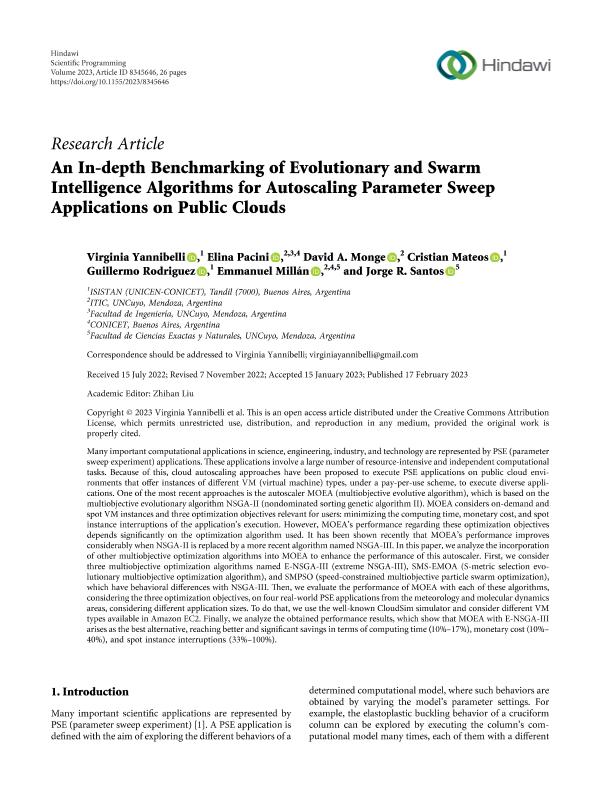Mostrar el registro sencillo del ítem
dc.contributor.author
Yannibelli, Virginia Daniela

dc.contributor.author
Pacini Naumovich, Elina Rocío

dc.contributor.author
Monge Bosdari, David Antonio

dc.contributor.author
Mateos Diaz, Cristian Maximiliano

dc.contributor.author
Rodríguez, Guillermo Horacio

dc.contributor.author
Millán, Emmanuel Nicolás

dc.contributor.author
Santos, Jorge Ruben

dc.date.available
2024-01-18T14:54:41Z
dc.date.issued
2023-02
dc.identifier.citation
Yannibelli, Virginia Daniela; Pacini Naumovich, Elina Rocío; Monge Bosdari, David Antonio; Mateos Diaz, Cristian Maximiliano; Rodríguez, Guillermo Horacio; et al.; An In-depth Benchmarking of Evolutionary and Swarm Intelligence Algorithms for Autoscaling Parameter Sweep Applications on Public Clouds; Hindawi Publishing Corporation; Scientific Programming; 2023; 2-2023; 1-26
dc.identifier.issn
1058-9244
dc.identifier.uri
http://hdl.handle.net/11336/224139
dc.description.abstract
Many important computational applications in science, engineering, industry, and technology are represented by PSE (parameter sweep experiment) applications. Tese applications involve a large number of resource-intensive and independent computational tasks. Because of this, cloud autoscaling approaches have been proposed to execute PSE applications on public cloud environments that ofer instances of diferent VM (virtual machine) types, under a pay-per-use scheme, to execute diverse applications. One of the most recent approaches is the autoscaler MOEA (multiobjective evolutive algorithm), which is based on the multiobjective evolutionary algorithm NSGA-II (nondominated sorting genetic algorithm II). MOEA considers on-demand and spot VM instances and three optimization objectives relevant for users: minimizing the computing time, monetary cost, and spot instance interruptions of the application’s execution. However, MOEA’s performance regarding these optimization objectives depends signifcantly on the optimization algorithm used. It has been shown recently that MOEA’s performance improves considerably when NSGA-II is replaced by a more recent algorithm named NSGA-III. In this paper, we analyze the incorporation of other multiobjective optimization algorithms into MOEA to enhance the performance of this autoscaler. First, we consider three multiobjective optimization algorithms named E-NSGA-III (extreme NSGA-III), SMS-EMOA (S-metric selection evolutionary multiobjective optimization algorithm), and SMPSO (speed-constrained multiobjective particle swarm optimization), which have behavioral diferences with NSGA-III. Ten, we evaluate the performance of MOEA with each of these algorithms, considering the three optimization objectives, on four real-world PSE applications from the meteorology and molecular dynamics areas, considering diferent application sizes. To do that, we use the well-known CloudSim simulator and consider diferent VM types available in Amazon EC2. Finally, we analyze the obtained performance results, which show that MOEA with E-NSGA-III arises as the best alternative, reaching better and signifcant savings in terms of computing time (10%–17%), monetary cost (10%– 40%), and spot instance interruptions (33%–100%).
dc.format
application/pdf
dc.language.iso
eng
dc.publisher
Hindawi Publishing Corporation

dc.rights
info:eu-repo/semantics/openAccess
dc.rights.uri
https://creativecommons.org/licenses/by-nc-sa/2.5/ar/
dc.subject
PARAMETER SWEEP EXPERIMENTS
dc.subject
CLOUD COMPUTING
dc.subject
CLOUD AUTOSCALING
dc.subject
MULTI-OBJECTIVE EVOLUTIONARY ALGORITHM
dc.subject
MULTI-OBJECTIVE PARTICLE SWARM OPTIMIZATION
dc.subject.classification
Ciencias de la Computación

dc.subject.classification
Ciencias de la Computación e Información

dc.subject.classification
CIENCIAS NATURALES Y EXACTAS

dc.title
An In-depth Benchmarking of Evolutionary and Swarm Intelligence Algorithms for Autoscaling Parameter Sweep Applications on Public Clouds
dc.type
info:eu-repo/semantics/article
dc.type
info:ar-repo/semantics/artículo
dc.type
info:eu-repo/semantics/publishedVersion
dc.date.updated
2023-12-07T17:49:45Z
dc.journal.volume
2023
dc.journal.pagination
1-26
dc.journal.pais
Países Bajos

dc.description.fil
Fil: Yannibelli, Virginia Daniela. Consejo Nacional de Investigaciones Científicas y Técnicas. Centro Científico Tecnológico Conicet - Tandil. Instituto Superior de Ingeniería del Software. Universidad Nacional del Centro de la Provincia de Buenos Aires. Instituto Superior de Ingeniería del Software; Argentina
dc.description.fil
Fil: Pacini Naumovich, Elina Rocío. Universidad Nacional de Cuyo. Facultad de Ingeniería; Argentina. Universidad Nacional de Cuyo. Instituto para las Tecnologías de la Informacion y las Comunicaciones; Argentina. Consejo Nacional de Investigaciones Científicas y Técnicas; Argentina
dc.description.fil
Fil: Monge Bosdari, David Antonio. Universidad Nacional de Cuyo. Instituto para las Tecnologías de la Informacion y las Comunicaciones; Argentina. Consejo Nacional de Investigaciones Científicas y Técnicas; Argentina
dc.description.fil
Fil: Mateos Diaz, Cristian Maximiliano. Consejo Nacional de Investigaciones Científicas y Técnicas. Centro Científico Tecnológico Conicet - Tandil. Instituto Superior de Ingeniería del Software. Universidad Nacional del Centro de la Provincia de Buenos Aires. Instituto Superior de Ingeniería del Software; Argentina
dc.description.fil
Fil: Rodríguez, Guillermo Horacio. Consejo Nacional de Investigaciones Científicas y Técnicas. Centro Científico Tecnológico Conicet - Tandil. Instituto Superior de Ingeniería del Software. Universidad Nacional del Centro de la Provincia de Buenos Aires. Instituto Superior de Ingeniería del Software; Argentina
dc.description.fil
Fil: Millán, Emmanuel Nicolás. Consejo Nacional de Investigaciones Científicas y Técnicas; Argentina. Universidad Nacional de Cuyo. Instituto para las Tecnologías de la Informacion y las Comunicaciones; Argentina. Universidad Nacional de Cuyo. Facultad de Ciencias Exactas y Naturales; Argentina
dc.description.fil
Fil: Santos, Jorge Ruben. Universidad Nacional de Cuyo. Facultad de Ciencias Exactas y Naturales; Argentina
dc.journal.title
Scientific Programming

dc.relation.alternativeid
info:eu-repo/semantics/altIdentifier/url/https://www.hindawi.com/journals/sp/2023/8345646/
dc.relation.alternativeid
info:eu-repo/semantics/altIdentifier/doi/http://dx.doi.org/10.1155/2023/8345646
Archivos asociados
